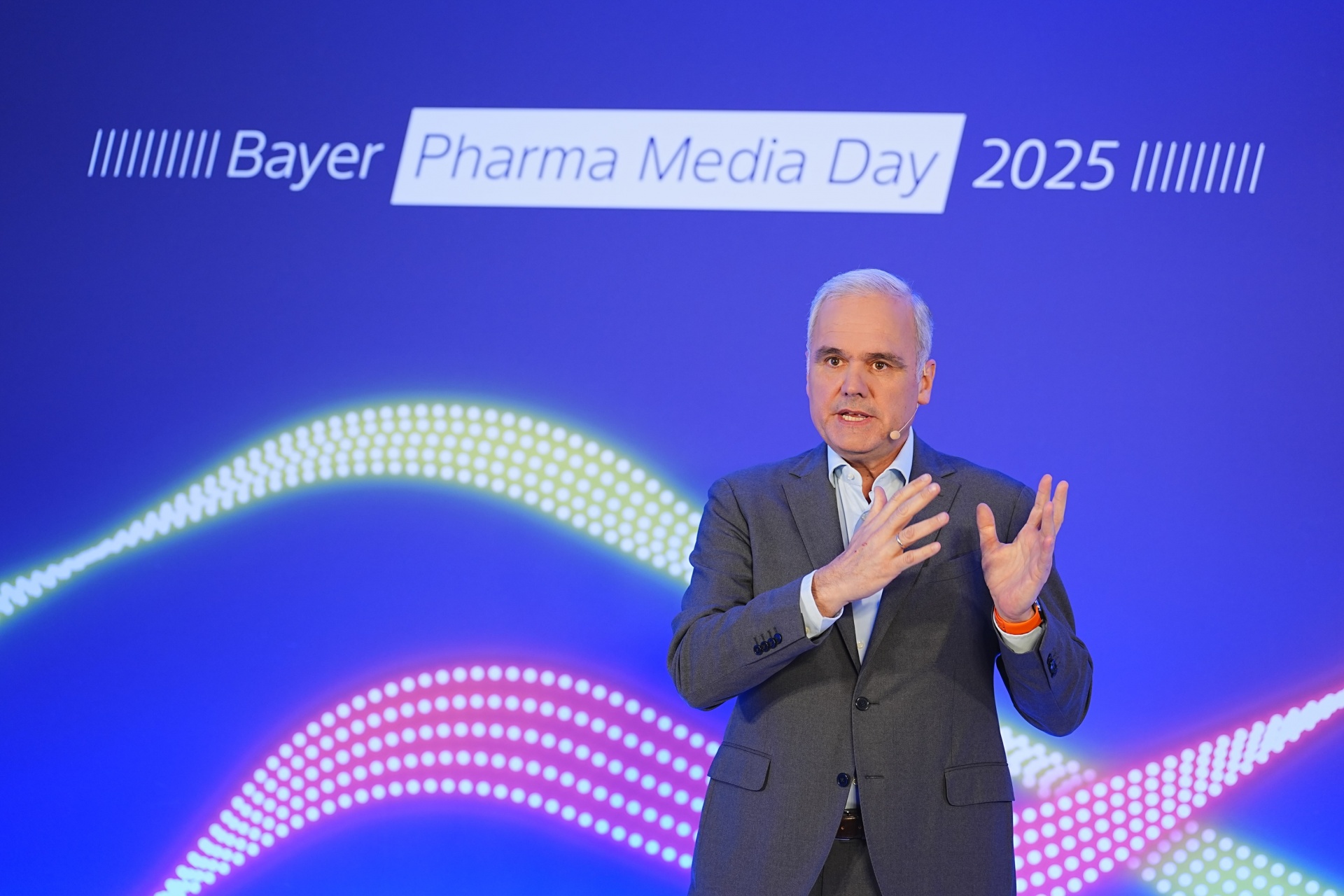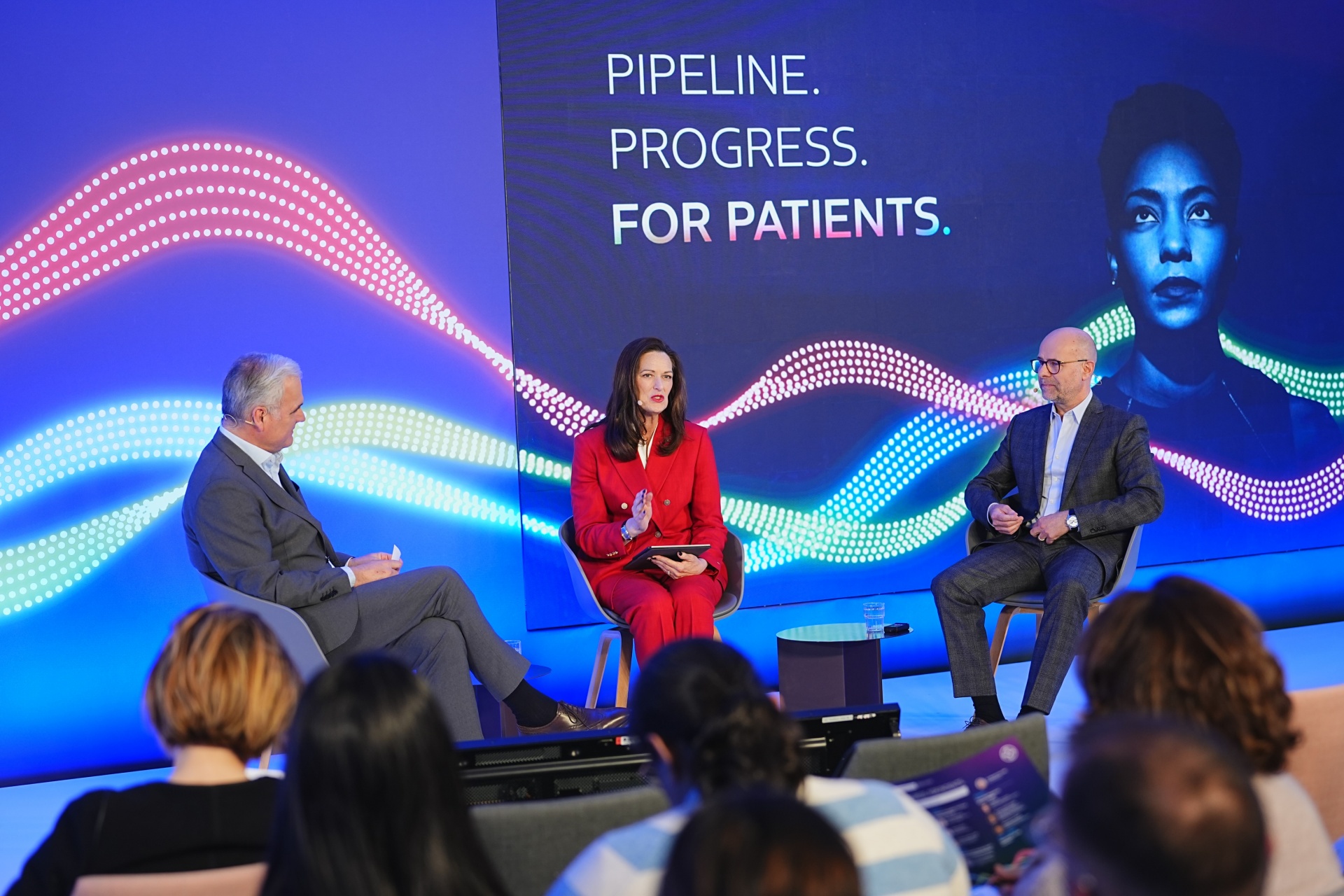Bayer Pharmaceuticals poised for landmark year
As part of the ongoing transformation of its pharmaceutical business, Bayer has made significant investments in research and development (R&D) to accelerate medical innovations and build a highly differentiated pipeline for long-term growth across key therapeutic areas, including oncology, cardiovascular diseases, neurology, rare diseases, and immunology. Bayer is also making significant progress with its cell and gene therapy platform, achieving important clinical trial milestones, especially in Parkinson’s disease.
"2025 is set to be a landmark year for Bayer Pharmaceuticals. We are bringing a number of groundbreaking products and our growth strategy is on track to deliver significant value," said Stefan Oelrich, member of the Board of Management, Bayer AG, and president of Bayer’s Pharmaceuticals Division.
 |
| Stefan Oelrich, member of the Board of Management, Bayer AG, and president of Bayer’s pharmaceuticals division |
Focusing on areas of greatest unmet medical need and highest value potential, Bayer has increased the quality of its pipeline. This year, the company plans to offer a number of new treatment options:
- Expanding its cardiology portfolio with a new treatment for transthyretin amyloid cardiomyopathy in Europe.
- New treatment option for patients with heart failure and a left ventricular ejection fraction of 40 per cent or greater, a widespread form of heart failure, by the end of the 2025.
- Innovative hormone-free treatment to relieve moderate to severe vasomotor symptoms in menopausal women.
- New treatment option for men with metastatic hormone-sensitive prostate cancer, further building Bayer’s leadership position in this field.
"We are shaping a new era of medicine, confident that we can not only transform patient care through innovation and a robust product portfolio, but also by accelerating patient access to new medicines. With every new development, we are getting one step closer to realising our vision to treat the untreatable, cure disease and offer hope," said Christine Roth, executive vice president of Global Product Strategy and Commercialisation and member of the Pharmaceuticals Leadership Team at Bayer.
"During Pharma Media Day, we highlighted key advancements, including new treatments for transthyretin amyloid cardiomyopathy and heart failure, as well as an upcoming hormone-free option for menopausal symptoms. We also anticipate regulatory approval for a promising oncology treatment option in 2025, reinforcing our commitment to innovation in healthcare," added Christine.
Christian Rommel, member of the Executive Committee of Bayer’s pharmaceuticals division and head of Research and Development, said, "Our strategic transformation has yielded significant progress in R&D to deliver a competitively structured and differentiated pipeline. Last year, our late-stage Phase III trials delivered positive outcomes, so it’s clear we are seeing the impact of our enhanced capabilities and clarity on our strategic priorities."
"Our renewed early pipeline positions us for long-term growth and allows us to progress targeted treatments that promise to significantly improve patient outcomes. Now, we are poised to deliver innovative therapies that will make a meaningful difference in patients' lives while driving sustainable business growth," he added.
Growth and leadership in oncology
Through the clinical development of its oncology pipeline, Bayer is building on its goal to become a leader in the treatment of prostate cancer - the second most commonly diagnosed cancer in men.
Bayer is focused on three scientific areas that have the potential to address unmet needs for patients with cancer, which include targeted radiopharmaceuticals (specifically targeted alpha therapies), next-generation immuno-oncology and precision molecular oncology. In these areas, the company is advancing truly first-in-class, highly innovative projects within its portfolio.
Targeted radionuclide therapy (TRT) is a strategic area of focus for Bayer in oncology precision drug development, building on more than 10 years of real-world experience with a targeted alpha therapy for patients with metastatic castration-resistant prostate cancer (mCRPC). Bayer's evolving TRT portfolio includes novel targeting approaches that combine alpha radionuclides with different targeting moieties including antibodies, small molecules, or peptide-based molecules. Two TRT candidates are currently in Phase I clinical trials.
Strategic investments in R&D and platform companies are further strengthening Bayer’s pipeline. With Vividion’s acquisition of Tavros Therapeutics, Bayer continues to leverage its chemoproteomics technology platform to unlock traditionally undruggable targets with precision small-molecule therapeutics. Bayer has initiated Phase I trials for the treatment of solid tumours and solid and haematologic malignancies.
 |
The next generation of cardiovascular therapies
Building on its strong late-stage projects, Bayer has set a clear directive towards precision cardiology, exploring innovative approaches across a diverse range of modalities. By doing so, the company aims to push the boundaries of innovation for patients with cardiovascular diseases with high unmet needs and even potentially reverse life-altering conditions.
Complementing in-house expertise with external collaborations remains a vital part of Bayer’s strategy to expand its R&D expertise and develop cardiovascular therapies, with the goal of addressing high unmet medical needs.
Through AskBio, a wholly owned subsidiary of Bayer, Bayer is developing a gene therapy as a potential new approach for treating congestive heart failure. Following its acquisition, Bayer gained access to AskBio’s industry-leading gene therapy platform with demonstrated applicability and world-class manufacturing facilities and is already making progress with its Phase II assets.
Pioneering progress in women’s health
Seeking to address unmet needs in menopausal women and identify solutions to improve the quality of life, Bayer is investing in innovations to broaden the therapeutic landscape and raise the standard of care for menopausal women.
In 2025, Bayer plans to launch a new hormone-free treatment option for menopause, which has recently shown consistent promise in reducing the frequency and severity of moderate to severe vasomotor symptoms (hot flashes) associated with menopause or caused by breast cancer treatments. Reductions in sleep disturbances and improvements in menopause-related quality of life have also been noted in the Phase III clinical studies.
Overall, the treatment may address important unmet medical needs for women experiencing menopause or treatment-induced menopausal symptoms. With regulatory submissions under review globally, Bayer anticipates a potential launch in the US and Europe this year.
Cell and gene therapy for Parkinson’s disease
Bayer and BlueRock Therapeutics, another wholly owned subsidiary of Bayer, are developing an investigational cell therapy based on the surgical implantation of dopamine-generating nerve cell precursors into the brain. The candidate is advancing directly to Phase III clinical development following positive Phase I data. The US Food and Drug Administration (FDA) has granted a Regenerative Medicine Advanced Therapy (RMAT) designation for its innovative potential in treating Parkinson's disease.
Through AskBio, Bayer is developing an investigational viral-based gene therapy for Parkinson’s disease to potentially restore the function of dopamine-producing neurons. The candidate is advancing to Phase II, with the randomisation of participants in the clinical trial. Based on preliminary clinical evidence, FDA granted RMAT to this therapy for its potential to slow disease progression and improve motor outcomes in patients with moderate Parkinson’s disease. The therapy also received FDA Fast Track designation.
 | Bayer unveils medical breakthroughs German pharmaceutical company Bayer is set to embark on its next phase of growth by unveiling a new wave of medical breakthroughs. |
 | Bayer accelerates innovation in Pharmaceuticals At its annual Pharma Media Day, Bayer presented the recent progress it has made in the ongoing transformation of its pharmaceutical business, focusing on accelerating innovative healthcare solutions and delivering long-term, sustainable growth. |
 | Bayer’s Pharma Business in Asia-Pacific drives growth Bayer announced that 2021 was another record year for its Pharmaceuticals division in the Asia-Pacific region, with robust growth of 4.8 per cent delivering sales of more than $6.3 billion. Business in the region contributed to almost one-third of Bayer’s global sales of pharmaceuticals. |
What the stars mean:
★ Poor ★ ★ Promising ★★★ Good ★★★★ Very good ★★★★★ Exceptional
Related Contents
Latest News
More News
- Agentic AI set to reshape Vietnam’s enterprise landscape (February 10, 2026 | 12:06)
- Agro-forestry and fisheries exports jump nearly 30 per cent in January (February 09, 2026 | 17:45)
- Canada trade minister to visit Vietnam and Singapore (February 09, 2026 | 17:37)
- New tax incentives to benefit startups and SMEs (February 09, 2026 | 17:27)
- Vietnam forest protection initiative launched (February 07, 2026 | 09:00)
- China buys $1.5bn of Vietnam farm produce in early 2026 (February 06, 2026 | 20:00)
- Vietnam-South Africa strategic partnership boosts business links (February 06, 2026 | 13:28)
- Mondelez Kinh Do renews the spirit of togetherness (February 06, 2026 | 09:35)
- Seafood exports rise in January (February 05, 2026 | 17:31)
- Accelerating digitalisation of air traffic services in Vietnam (February 05, 2026 | 17:30)

 Tag:
Tag:




















 Mobile Version
Mobile Version